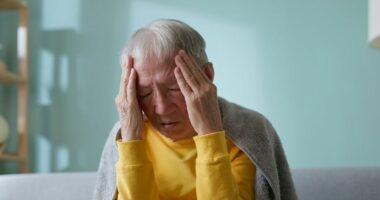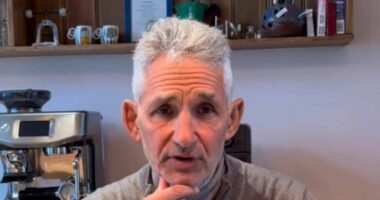Share this @internewscast.com
When we’re on the plane and our ears pop, it’s something we’re all used to. But did you know there’s ways to prevent it – and in fact, some people may be more at risk of this happening than others.
According to ear experts at Specsavers UK, ear barotrauma – also known as airplane ear – is a condition caused by changes in air pressure and typically affects the ears. Whilst anyone can be affected, people with narrow eustachian tubes are at higher risk.
This includes children, who are prone to airplane ear and may experience worse symptoms.
Other people more at risk include those with hay fever and allergies, people suffering from a sinus infection or the common cold, as well as people with a middle ear infection (otitis media).
What are the symptoms of ear barotrauma and why does it happen?
This condition occurs because high-pressure environments can strain your eardrum, typically due to rapid altitude changes. This is the familiar sensation of your ears “popping” during a flight or underwater dive – and we’ve probably all had it.
The pain and discomfort you feel during a flight – including temporary hearing loss – is nothing to worry about. It’s caused by a difference in air pressure between your middle ear and the cabin pressure. But it’s not just this as you may also have:
- Feeling of pressure, fullness or discomfort in the ear
- Muffled sound or difficulty hearing
- Ear pain
- Muffled hearing
- Slight to moderate hearing loss
- Ringing in your ear
- Vertigo
- In more advanced cases, you might experience severe ear pain, injury to the eardrum and dizziness
What causes ear barotrauma?
The experts explained: “Our ears contain tubes (called Eustachian tubes) that connect your nose and throat to the middle of your ear, as well as being responsible for balancing your ear pressure. When these tubes become blocked, it affects the way the ear pressure is managed and can cause ear barotrauma.
“Pressure changes associated with high altitudes is the most common reason for this, and most people will experience the conditions when a plane is landing or taking off, when they go diving, or if they are in a mountainous area where air pressure varies. Higher pressure can cause the eardrum to stretch, which is why your hearing is affected.”
How can I prevent my ears popping on a plane?
If you’re flying to jet away on holiday or spending time in high-altitude areas like mountains, there are several ways to help keep the tubes in your ears open and reduce the risk of ear barotrauma. This includes:
- Drinking plenty of water
- Yawn regularly to keep the eustachian tubes open
- Chew gum or suck on sweets
- Stay awake while the plane is landing
- Wear earplugs designed for air travel – filtered earplugs can be used to slowly equalise the pressure against your eardrum while flying
- Antihistamines or decongestants may help if you have allergies or a cold
The experts urge people to try one technique which could work a charm, but you need to be careful when doing it. Called the valsalva manoeuvre, you need to pinch your nostrils shut and gently blow air back into the nose.
They warn: “This must be done carefully, with little force, or it can cause damage to the eardrum. If your symptoms persist for more than a few days after the flight or high-pressure scenario, seek advice from your doctor as soon as you can. They might be able to offer other treatment options, such as an earpopper or otovent.”
Should I see my GP?
Not always. But if you experience intense pain, dizziness, or notice any fluid or discharge from your ear, it’s important to get an appointment with your GP. You should also seek medical advice if you have hearing loss that doesn’t improve, as a specialist may need to assess it to ensure nothing else needs to be done.
But in most cases, don’t worry, it should clear on its own in a matter of minutes to an hour after your symptoms first begin.
Specsavers conclude by warning that in more severe cases, treatment and recovery time will depend on the underlying cause. They note that “ear barotrauma can sometimes result in a ruptured eardrum, which can take a few weeks to completely heal.” So if you’re ever in doubt, always seek advice from a GP.
















